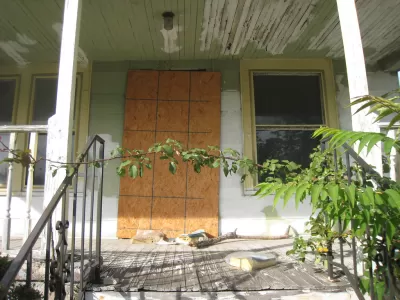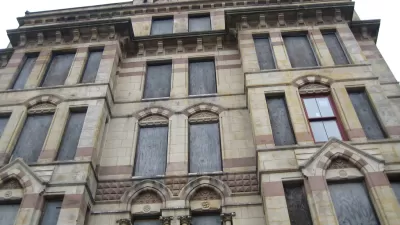Mobile, Alabama, has changed the way it deals with blight, and the results have been substantial.

Hana Schank explores the legal and policy changes in Mobile, Alabama, that have helped the city turn around a blight problem that was consuming neighborhoods, exacerbating segregation, and hindering economic development.
The city's innovation team, a project funded by Bloomberg Philanthropies, and a mayor who made blight a priority have been instrumental in altering how blight is defined, identified, and addressed as well as the legal underpinnings related to ownership of properties.
The innovation team started identifying "blight zones," instead of individual structures, and developed an index that has helped the city’s blight task force more effectively pinpoint properties where action is needed. The city also stopped issuing fines and instead started giving owners the opportunity to make repairs. If they failed to do so, the city would take on the task and then place a lien on the property for the costs.
Schank details the history of the onerous state property laws that made it difficult for the city to get new owners into repaired homes. "Last year, prompted in large part by the Mobile innovation team’s work, the Alabama state house passed HB430, which allows cities to use municipal liens, rather than tax delinquency, to claim ownership of a property."
The number of blighted properties in Mobile has dropped by almost half in four years, says Schank. "This is the story of how one city reduced blight, but it is also the story of what happens when cities think differently about how to solve their problems, when politicians are willing to embrace policies that might not line up with the party line, when city workers look beyond band-aid solutions."
FULL STORY: Blight is eating American cities. Here’s how Mobile, Alabama, stopped it

Planetizen Federal Action Tracker
A weekly monitor of how Trump’s orders and actions are impacting planners and planning in America.

Congressman Proposes Bill to Rename DC Metro “Trump Train”
The Make Autorail Great Again Act would withhold federal funding to the system until the Washington Metropolitan Area Transit Authority (WMATA), rebrands as the Washington Metropolitan Authority for Greater Access (WMAGA).

The Simple Legislative Tool Transforming Vacant Downtowns
In California, Michigan and Georgia, an easy win is bringing dollars — and delight — back to city centers.

The States Losing Rural Delivery Rooms at an Alarming Pace
In some states, as few as 9% of rural hospitals still deliver babies. As a result, rising pre-term births, no adequate pre-term care and "harrowing" close calls are a growing reality.

The Small South Asian Republic Going all in on EVs
Thanks to one simple policy change less than five years ago, 65% of new cars in this Himalayan country are now electric.

DC Backpedals on Bike Lane Protection, Swaps Barriers for Paint
Citing aesthetic concerns, the city is removing the concrete barriers and flexposts that once separated Arizona Avenue cyclists from motor vehicles.
Urban Design for Planners 1: Software Tools
This six-course series explores essential urban design concepts using open source software and equips planners with the tools they need to participate fully in the urban design process.
Planning for Universal Design
Learn the tools for implementing Universal Design in planning regulations.
Smith Gee Studio
City of Charlotte
City of Camden Redevelopment Agency
City of Astoria
Transportation Research & Education Center (TREC) at Portland State University
US High Speed Rail Association
City of Camden Redevelopment Agency
Municipality of Princeton (NJ)




























